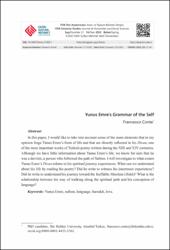Yunus Emre’s Grammar of the Self
Citation
CONTE Francesco. "Yunus Emre’s Grammar of the Self." FSM İlmi Araştırmalar İnsan ve Toplum Bilimleri Dergisi, 21 (2023): 27-60.Abstract
In this paper, I would like to take into account some of the main elements that in my
opinion forge Yunus Emre’s form of life and that are directly reflected in his Divan, one
of the most important works of Turkish poetry written during the XIII and XIV centuries.
Although we have little information about Yunus Emre’s life, we know for sure that he
was a dervish, a person who followed the path of Sufism. I will investigate to what extent
Yunus Emre’s Divan relates to his spiritual journey experiences. What can we understand
about his life by reading his poetry? Did he write to witness his innermost experiences?
Did he write to understand his journey toward the Ineffable Absolute (Hakk)? What is the
relationship between his way of walking along the spiritual path and his conception of
language? Bu makalede, Yunus Emre’nin yaşam biçimini oluşturan ve XIII. ve XIV. yüzyıllarda
yazılmış en önemli Türk şiiri eserlerinden biri olan Divan’ına doğrudan yansıyan bazı
ana unsurları dikkate almak istiyorum. Yunus Emre’nin hayatı hakkında çok az bilgiye
sahip olsak da onun bir derviş, tasavvuf yolunu takip eden bir kişi olduğunu kesin olarak
biliyoruz. Yunus Emre’nin Divan’ının onun manevi yolculuğundaki deneyimleriyle
ne ölçüde ilişkili olduğunu araştıracağım. Şiirlerini okuyarak onun hayatı hakkında ne
anlayabiliriz? En derin deneyimlerine tanıklık etmek için mi yazdı? Tarifsiz Öteki’ye
(Hakk’a) doğru kendi yolculuğunu anlamak için mi yazdı? Manevi yolda yürüme biçimi
ile dil anlayışı arasındaki ilişki nedir? Makalede bu soruların cevabı aranacaktır.



















